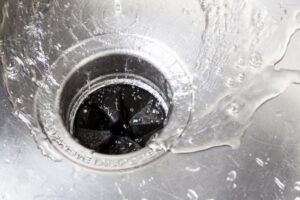It can be so useful to have a garbage disposal in your kitchen sink. It streamlines cleanup and makes dishwashing less of a hassle. Unfortunately, the term “garbage disposal” is a bit misleading. You definitely should never put any actual garbage down your sink! But the exact recommendations are a little more specific than that. If you’re concerned about what’s okay to put down your garbage disposal and what should be disposed of elsewhere, we’ve got a handy list for you.
For Your Safety
The first thing you should absolutely never put into your garbage disposal is your hands. Even when it is turned off, even if it is not functioning, even if something is lodged inside it and it looks like it would be easy to pull it free, never, ever reach your hand into the garbage disposal.
There are no actual blades in there, as some people imagine. The way the disposal works is by using blunt impellers that spin rapidly to push the food waste toward the outside of the opening, where it is mashed against the grind ring. Therefore, even without blades, it is a terribly dangerous place for fingers to be.
In the case of something being lodged in the impellers, you can use a long, sturdy wooden handle, such as that of a broom or a large wooden spoon, to try to remove the object. If that fails, call a plumber to help with your garbage disposal in Boston so you don’t end up having to call an ambulance.
Disposal Don’ts
- Inedible Parts: Bones, popcorn kernels, fruit pits, and other items of food waste that cannot be chewed shouldn’t go down the disposal.
- Tough Fibers: Anything with long, stringy fibers can get tangled around the impellers. Celery stalks, onion skins, and corn husks should be composted or thrown away.
- Fat, Oil, and Grease: Plumbers refer to these as “FOG” and they are a leading cause of clogged drains. While they may be liquid when warm, they solidify when cold and build up to create fatty blockages in your pipes. Wipe greasy dishes with a paper towel before washing them.
- Coffee Grounds: While these are small and might pass harmlessly through, they can easily accumulate over time, especially where there is FOG to stick to. You don’t want your sink to drain as slowly as your drip coffeemaker, so it’s best to compost or toss your coffee grounds.
- Starches: Rice or pasta will continue to soak up water and expand, which means they might go down the disposal easily but then swell inside your plumbing, causing clogs.
- Ice Cubes: Sometimes, customers say they’ve heard of using ice cubes to sharpen the blades of garbage disposals. As you now know, there are no blades and even if there were, ice cubes would only damage them. Ice should never be ground in your disposal.
Disposal Do’s
- Soft Foods: Cooked vegetables, applesauce, bananas, and other foods with soft textures will go easily down your disposal.
- Vegetable scraps: Carrot or potato peels and other non-fibrous vegetable scraps are fine.
- Meat: As long as it is not greasy and in small pieces, meat can be put down the disposal.
- Citrus Peels: While these may seem a little tough, your disposal can handle them, and there’s a delightful bonus: they will make your kitchen smell fantastic.
Reach out to Cooling Unlimited, Inc. with any questions or to make an appointment for garbage disposal repair.


